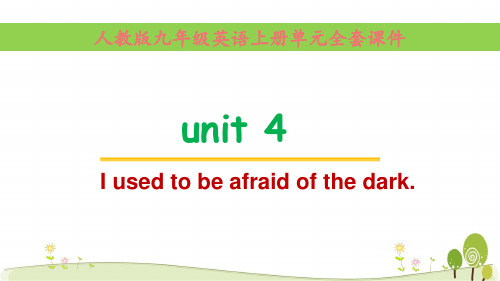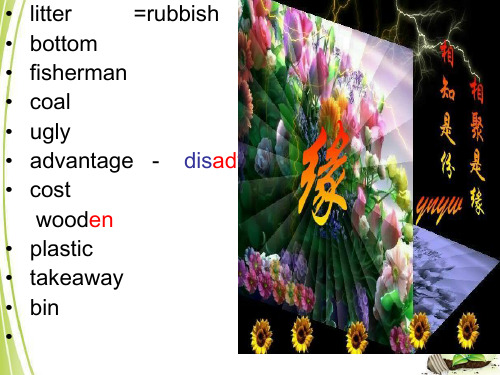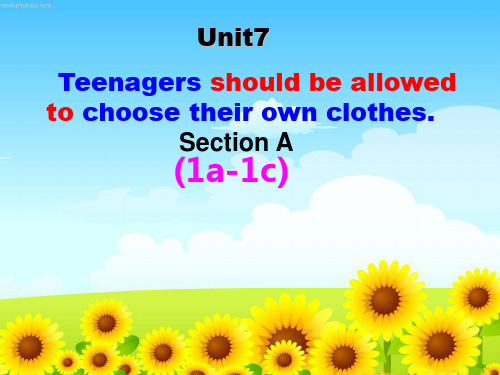人教版九年级英语unit全单元 ppt课件
合集下载
人教版英语九年级上unit4单元全套优质课件

Listen again and complete the exercise.
Conversation 1 Bob is here with his __p_a_r_e_n_t_s____ and he hasn't seen Mario for __fo_u__r___ years.
Conversation 2 Amy used to be really tall because Bob was ___s_h_o_r_t __ in the past.
3. If you're happy, you can find your changes.
Look at the pictures and describe the people.
What does he/she look like?
short/ brown hair 短/棕色头发
long /black hair 长/黑头发
1. Mario used to be__sh_o_r_t_ . He used to wear_g_l_a_ss_e_s_.
2. Amy used to be__t_a_ll____. She used to have __sh_o_r_t__hair.
3. Tina used to haver_e_d___ andc_u_r_ly___ hair.
➢Make sentences
He/She used to be/have/wear…, but now he/she is/has/wears ….
short/tall
young/old
heavy/thin
➢ change in personality
V S
人教版九年级unit1全单元课件(94张PPT)

现在完成时强调这一动作与现
在的关系,如对现在产生的结
果、影响等,而一般过去时只
表示过去的事实,不表示和现
在的关系。如:
I have just been to London. I went there last month. 我刚去过伦敦,是上个月去的。 I have been to the science museum many times. I went there on our last summer vocation. 我已经去了科学博物馆很多次。 上个暑假我还去了呢。
How do you study English?
I study English by taking part in English Contest
How do you study English?
I study English by watching English movies
“by + 动名词”常常表示手段、 方式或方法,可以用来回答how引 导的特殊疑问句。
have (has) been to 后面可接次数, 表示去过某地几次。 I’ve been to Beijing three times. 我去过北京三次。 They have been to that village several times. 他们去过那个村庄好几次了。
2. have (has) gone to 意为“到某 地去了”,表示到了某地或正在 去某地的途中。总之,说话时该 人不在现场,一般不用第一、第 二人称代词作句子的主语。如: - Where is Tom? 汤姆在哪里? - He has gone to the bookshop.
2. But I was afraid to ask questions because my pronunciation was very bad.
人教版九年级Unit13全单元ppt课件

5
noise pollution 噪音污染
There are more cars on the road.
6
Here are some words related to
1a different kinds of pollution. Write
them in the box below. Then add more words.
11
litter v. 乱扔 【U】
n. 垃圾
rubbish waste
垃圾
废弃物
People should throw away litter in the bin.
n. 垃圾箱 12
4. Even the bottom of the river was full of rubbish.
Yes, but people are throwing litter into the river.
9
1b Listen and complete the sentences.
What was the problem? The river was __r_e_a_ll_y_d_i_r_ty___. Even the bottom (底部) of the river was full of _r_u_b_b_i_s_h__. There were no more __fi_s_h__ for fishermen (渔民) to catch.
1
1. We’re trying try to do =try one’s best to do 努力去做某事。
e.g. Every student should try to study hard in order to study in a university. 为了进入大学学习,每个学生都应该 努力学习。
noise pollution 噪音污染
There are more cars on the road.
6
Here are some words related to
1a different kinds of pollution. Write
them in the box below. Then add more words.
11
litter v. 乱扔 【U】
n. 垃圾
rubbish waste
垃圾
废弃物
People should throw away litter in the bin.
n. 垃圾箱 12
4. Even the bottom of the river was full of rubbish.
Yes, but people are throwing litter into the river.
9
1b Listen and complete the sentences.
What was the problem? The river was __r_e_a_ll_y_d_i_r_ty___. Even the bottom (底部) of the river was full of _r_u_b_b_i_s_h__. There were no more __fi_s_h__ for fishermen (渔民) to catch.
1
1. We’re trying try to do =try one’s best to do 努力去做某事。
e.g. Every student should try to study hard in order to study in a university. 为了进入大学学习,每个学生都应该 努力学习。
人教版九年级英语全册Unit 12 Life is full of unexpected全单元课件

2. 到六点钟为止他们已经工作八小时了。 By six o’clock they _h_a_d__w_o_r_k_e_d____(work) for eight hours.
用法:
2. 过去完成时词可以表示过去某一时 刻之前发生的动作或呈现的状态,这 一动作一直持续 或将继续下去。
1. 到了六点钟为止,他们已经工作了八小时了。
1. 她到家之前她的孩子已经睡着了。 When she got home her children, _h_a_d__s_le_p_t____(sleep). 2. 在他们到达之前电影已经开始了。 Before they arrived here, the film ___h_a_d____ already ___s_ta_r_t_e_d___ (start). 3. 到昨晚上,他已写完那封信。 By yesterday evening he _h_a_d__w_r_i_t_te_n_ (write) that letter.
3.到上个月中旬我们在北京住了有五年时间了。
By the middle of last month we ____h_a_d__l_iv_e_d___(live) in Beijing for five years.
The Past Perfect Tense 过去完成时
常用于: (1)含介词by到…为止, before 等时间短语的句中.
2a Listen to Mary continue her story. Number the pictures [1-4] in the correct order.
3
1
4 2
2b Fill in the blanks with the correct
用法:
2. 过去完成时词可以表示过去某一时 刻之前发生的动作或呈现的状态,这 一动作一直持续 或将继续下去。
1. 到了六点钟为止,他们已经工作了八小时了。
1. 她到家之前她的孩子已经睡着了。 When she got home her children, _h_a_d__s_le_p_t____(sleep). 2. 在他们到达之前电影已经开始了。 Before they arrived here, the film ___h_a_d____ already ___s_ta_r_t_e_d___ (start). 3. 到昨晚上,他已写完那封信。 By yesterday evening he _h_a_d__w_r_i_t_te_n_ (write) that letter.
3.到上个月中旬我们在北京住了有五年时间了。
By the middle of last month we ____h_a_d__l_iv_e_d___(live) in Beijing for five years.
The Past Perfect Tense 过去完成时
常用于: (1)含介词by到…为止, before 等时间短语的句中.
2a Listen to Mary continue her story. Number the pictures [1-4] in the correct order.
3
1
4 2
2b Fill in the blanks with the correct
人教版九年级英语UNIT13第十三单元课件全单元

Mark: The river was dirty. Even the bottom of the river was full of rubbish.
Tony: But it used to be so clean! Mark: Yes, but people are littering in the
Interviewer: Great ideas! What about waste pollution?
Susan: Mmm, I think simple things like bringing a bag to go shopping can help. I started doing that a year ago.
river. Tony: Everyone in this town should play a
part in cleaning it up!
2a Listen to the interview. Circle the kinds of pollution that Jason and Susan talk about.
•
opening the door已经开了门
• 9 The book cost me 10 yuan
• It took me 3 hours to buy the book
• I spent 10 yuan on the book • I paid 10 yuan for the book • 10 She helps me (to )learn English
mobile
factories(sewage,
phones(machines, industrial waste,
crowds, vihicles) pesticides)
Tony: But it used to be so clean! Mark: Yes, but people are littering in the
Interviewer: Great ideas! What about waste pollution?
Susan: Mmm, I think simple things like bringing a bag to go shopping can help. I started doing that a year ago.
river. Tony: Everyone in this town should play a
part in cleaning it up!
2a Listen to the interview. Circle the kinds of pollution that Jason and Susan talk about.
•
opening the door已经开了门
• 9 The book cost me 10 yuan
• It took me 3 hours to buy the book
• I spent 10 yuan on the book • I paid 10 yuan for the book • 10 She helps me (to )learn English
mobile
factories(sewage,
phones(machines, industrial waste,
crowds, vihicles) pesticides)
人教版九年级英语上册教学课件:Unit7全单元课件

1cLookatthestatementsinlaand makeconversations. A:Idon’tthinksixteen-year-olds shouldbeallowedtodrive. B:Iagree.Theyaren’tseriousenough.
1.beallowedtodo被允许去做 2.theshoppingcenter购物中心 3.driver’slicense驾驶执照 4.sixteen-year-olds16岁的孩子
2.Sixteen-yearoldsshouldbeallowedtodrive.AD
3.Studentsshouldnotbeallowedtohavepar t-timejobs.AD
4.Sixteen-yearoldsshouldbeallowedtogettheirearspier ced.AD
空白演示
在此输入您的封面副标题
恩江中学吴起凡
DoyourparentsallowyoutowatchTV? Yes,theydo.
Youareallowedto watchTV.
allowsb.todosth. beallowedtodosth.
Doyourparentsallowyoutoexercise? Yes,theydo.
drive驾驶 driver驾驶员,司机 driver’slicense 驾驶证
n.证;证件
Myfamilyhassomerules.Lo okatthesepicturesandtellm ewhattheyare.
IaTV listentomusic makemyroomamess
Kathy
Molly
1.Sixteen-year-
人教目标九年级英语Unit7(全单元课件) (共69张PPT)

get h. done =have sth. done (让别人替自己)做某事
1.你的头发太长了。你最好去把头发理了。 Your hair is too long .You’ d better go and
g__e_t_/_h_a__v_e__y_o__u_r__h. air cut
我的自行车坏了。我想修理它。 2. My bike is broken . I want to ___________.
your safety. Anna: But Gaby’s getting her ears pierced at the shopping center and I want to watch. Mom: Sixteen-year-olds shouldn’t be allowed to get their ears pierced either. They’re
确保
这是一个否定前移的主从复合句。I/ we think 后面 的宾语从句如果是否定含义,则须将否定词前移 到主句上,即I/we don’t think … , 表示“我(们) 认为…不… ”. 类似于think 这一用法的动词还有:
believe…. 1.我认为他不对。I_d_o__n_’t__th_i_n_k__h_e__is__r_ig_h__t_..
Do you agree or disagree?
Students should not be allowed to take mobile phones to school.
1.be allowed to do sth. 被允许做某事 2.allow sb. to do sth. 允许某人做某事 3.allow doing sth. 允许做某事 Eg: Little kids aren’t allowed to play with fire火.
1.你的头发太长了。你最好去把头发理了。 Your hair is too long .You’ d better go and
g__e_t_/_h_a__v_e__y_o__u_r__h. air cut
我的自行车坏了。我想修理它。 2. My bike is broken . I want to ___________.
your safety. Anna: But Gaby’s getting her ears pierced at the shopping center and I want to watch. Mom: Sixteen-year-olds shouldn’t be allowed to get their ears pierced either. They’re
确保
这是一个否定前移的主从复合句。I/ we think 后面 的宾语从句如果是否定含义,则须将否定词前移 到主句上,即I/we don’t think … , 表示“我(们) 认为…不… ”. 类似于think 这一用法的动词还有:
believe…. 1.我认为他不对。I_d_o__n_’t__th_i_n_k__h_e__is__r_ig_h__t_..
Do you agree or disagree?
Students should not be allowed to take mobile phones to school.
1.be allowed to do sth. 被允许做某事 2.allow sb. to do sth. 允许某人做某事 3.allow doing sth. 允许做某事 Eg: Little kids aren’t allowed to play with fire火.
人教版九年级英语unit3全单元课件

对…有好处
使某人快乐 开办英语俱乐部 英英字典 英汉字典
31.basketball practice 32.a real mess 有做…的机会
篮球练习 一团乱麻
33. have an opportunity to do sth .== have a chance of doing sth
34.at least
7. need 需要
1) 情态动词:后接动词原形 2)实义动词 ① sb need to do sth 某人需要做某事 e.g. Yong people need to sleep ② sth need doing = sth need to be done 某物需要 被…… e.g. The bike needs repairing. = The bike needs to be repaired. 这辆自行车需要修理。
13.have an opportunity to do sth. / have a chance to do sth have an opportunity of doing sth / have a chance of doing sth. 有机会做某事 如:I have an opportunity to go to Beijing. I have a chance of going to Beijing.
5. stop doing sth. 停止做某事 e.g. 请停止说话。 stop to do sth. 停下来去做某事 e.g. 请停下来说话。 stop sb from doing sth. 阻止某人做某事。 e.g. 没人能阻止我去那儿。
can’t stop doing sth. 忍不住做某事 e.g. 他忍不住哭了。
- 1、下载文档前请自行甄别文档内容的完整性,平台不提供额外的编辑、内容补充、找答案等附加服务。
- 2、"仅部分预览"的文档,不可在线预览部分如存在完整性等问题,可反馈申请退款(可完整预览的文档不适用该条件!)。
- 3、如文档侵犯您的权益,请联系客服反馈,我们会尽快为您处理(人工客服工作时间:9:00-18:30)。
2020/4/3
remind sb to do sth 提醒某人做、、、 e.g. My parents often remind me to study ha3r.hde. art.内心,心 learn sth by heart.用心记,背诵 lose heart灰心 heart and soul全心全意
2020/4/3
11.to be honest 作插入语,经常单独使 用,用逗号与句子隔开。
e.g. To be honest, this food doesn’t taste
good.
12.stay
away
from
sb/
sth
远离某人/某物ຫໍສະໝຸດ e.g. You should stay away from dangerous t1h3i.nbges.shocked by…被、、、震惊
Unit 6
I like music that I can dance to.
2020/4/3
2020/4/3
2020/4/3
1.prefer
1.prefer+n./doing
e.g. I prefer swimming in the river.
I prefer Enlish. 2.Prefer sth to sth 比…更喜欢…./ prefer doing sth to doing sth. 喜欢做、、
2020/4/3
• 1.When people want to relax themselves,they prefer___C_ TV or listen to music rather than ____ newspapers.
• A. watching, read B. watching, to read
e.g. Everyone is shocked by him.
2020/4/3
1. I listened to one called Heart Strings. one 是代词,可指代上文中提到的同类东西当中的
2020/4/3
5.whatever=no matter what无论什么, 不管什么 引导让步状语从句
类似的词:疑问词+ever=no matter +疑问词 Eg: whoever(无论谁),whenever(无论何时), wherever(无论何地),however(无论怎样)
e.g. Whatever he does, he will not miss the party.
I prefer to write rather than readRe.ality = I would rather write than read. 2.remind 提醒 remind sb of sb/sth “使…记得,提醒
Creativity
eg. This song reminds him of his mother.
2020/4/3
I expect a letter from him. I expect to come back next week. I expect that I will get good grades this term. 10.Taste 尝起来 taste +adj 尝起来、、、、 这样的连系动词 look, sound, smell, feel 摸起来 e.g. The food tastes delicious.
、、不喜欢做、、、、
e.g. I prefer walking to cycling. 3.prefer to do sth 宁愿做某事
e.g. She prefers to be alone at home.
2020/4/3
prefer to do sth rather than do sth=would rather do sth than do sth. 宁愿做、、、、而不愿做、、、、
• C.to watch, read D. to watch, reading
• 2.She likes Chinese food better than American food.(改为同一句)
• Shep_r_e_f_erCshinese food __t_o_ American food. • 3.比起看电影我更愿意呆在家里。 • Ip_r_e_fe_r__s_ta_yaint ghome to _g_o_i_ngto the movies. • 4. I prefer doing exercise to _w_a_t_c_h(iwnagtch) TV.
2020/4/3
6.miss .v.错过 miss+名词 错过、、、 miss doing sth错过做、、、
e.g. I missed taking part in the sports meeting.
miss 想念
e.g. I miss you very much. 7.Suggest .v.暗示,显示,间接表明 suggest that 从句
2020/4/3
4.interest .n.兴趣,爱好
His two interests in life are painting and music. take an interest in…=be interested in…对、、、感 兴趣 e.g. He takes an interest in playing soccer. interest .v.使、、、感兴趣 e.g. The book may interest you.
e.g. His angry expression suggests that he is angry.
2020/4/3
suggest doing sth.建议做、、、
e.g. He suggested going out for a walk. 8.suit sb fine/well很合某人的意 e.g. Blue suits her very well. 9.expect .v. 期待,预料 expect +n/pron/ to do /that expect sb to do sth. 期待某人做、、、
remind sb to do sth 提醒某人做、、、 e.g. My parents often remind me to study ha3r.hde. art.内心,心 learn sth by heart.用心记,背诵 lose heart灰心 heart and soul全心全意
2020/4/3
11.to be honest 作插入语,经常单独使 用,用逗号与句子隔开。
e.g. To be honest, this food doesn’t taste
good.
12.stay
away
from
sb/
sth
远离某人/某物ຫໍສະໝຸດ e.g. You should stay away from dangerous t1h3i.nbges.shocked by…被、、、震惊
Unit 6
I like music that I can dance to.
2020/4/3
2020/4/3
2020/4/3
1.prefer
1.prefer+n./doing
e.g. I prefer swimming in the river.
I prefer Enlish. 2.Prefer sth to sth 比…更喜欢…./ prefer doing sth to doing sth. 喜欢做、、
2020/4/3
• 1.When people want to relax themselves,they prefer___C_ TV or listen to music rather than ____ newspapers.
• A. watching, read B. watching, to read
e.g. Everyone is shocked by him.
2020/4/3
1. I listened to one called Heart Strings. one 是代词,可指代上文中提到的同类东西当中的
2020/4/3
5.whatever=no matter what无论什么, 不管什么 引导让步状语从句
类似的词:疑问词+ever=no matter +疑问词 Eg: whoever(无论谁),whenever(无论何时), wherever(无论何地),however(无论怎样)
e.g. Whatever he does, he will not miss the party.
I prefer to write rather than readRe.ality = I would rather write than read. 2.remind 提醒 remind sb of sb/sth “使…记得,提醒
Creativity
eg. This song reminds him of his mother.
2020/4/3
I expect a letter from him. I expect to come back next week. I expect that I will get good grades this term. 10.Taste 尝起来 taste +adj 尝起来、、、、 这样的连系动词 look, sound, smell, feel 摸起来 e.g. The food tastes delicious.
、、不喜欢做、、、、
e.g. I prefer walking to cycling. 3.prefer to do sth 宁愿做某事
e.g. She prefers to be alone at home.
2020/4/3
prefer to do sth rather than do sth=would rather do sth than do sth. 宁愿做、、、、而不愿做、、、、
• C.to watch, read D. to watch, reading
• 2.She likes Chinese food better than American food.(改为同一句)
• Shep_r_e_f_erCshinese food __t_o_ American food. • 3.比起看电影我更愿意呆在家里。 • Ip_r_e_fe_r__s_ta_yaint ghome to _g_o_i_ngto the movies. • 4. I prefer doing exercise to _w_a_t_c_h(iwnagtch) TV.
2020/4/3
6.miss .v.错过 miss+名词 错过、、、 miss doing sth错过做、、、
e.g. I missed taking part in the sports meeting.
miss 想念
e.g. I miss you very much. 7.Suggest .v.暗示,显示,间接表明 suggest that 从句
2020/4/3
4.interest .n.兴趣,爱好
His two interests in life are painting and music. take an interest in…=be interested in…对、、、感 兴趣 e.g. He takes an interest in playing soccer. interest .v.使、、、感兴趣 e.g. The book may interest you.
e.g. His angry expression suggests that he is angry.
2020/4/3
suggest doing sth.建议做、、、
e.g. He suggested going out for a walk. 8.suit sb fine/well很合某人的意 e.g. Blue suits her very well. 9.expect .v. 期待,预料 expect +n/pron/ to do /that expect sb to do sth. 期待某人做、、、
